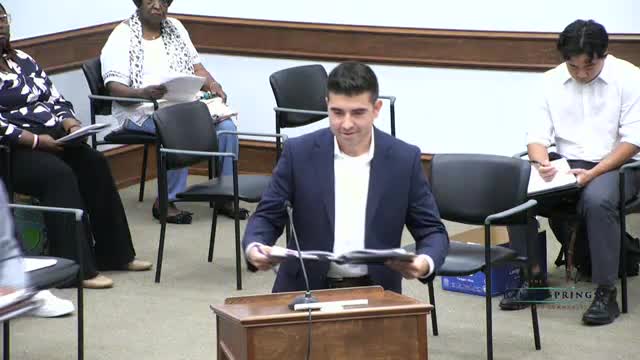Consultant outlines proposed water and sewer impact-fee program and 10-year CIP that supports growth
Get AI-powered insights, summaries, and transcripts
Subscribe
Summary
Consultant presented the draft land-use assumptions, a 10-year capital improvement plan and maximum allowable impact fees under Texas law; consultant said impact fees can be imposed only on new development and gave CIP cost totals used in the calculation.
Balch Springs’ consultant on Oct. 27 presented the draft land-use assumptions, capital-improvement plan and methodology the city intends to use to calculate water and sewer impact fees.
Jacob (last name not specified in transcript) of the consultant team explained that under Chapter 395, Subtitle C of the Texas statutes an impact fee is a one-time charge on new development to pay for the capital cost of system expansions needed to serve growth. He emphasized that impact fees may be charged only for new connections and not to pay to maintain existing infrastructure that serves existing customers.
The consultant said the impact-fee analysis compares the city’s 2025 system and a projected 2035 system, identifies capital projects needed to deliver capacity for new development, and estimates project costs to derive maximum impact-fee amounts. For the water portion the consultant identified 13 CIP projects tied to growth with a combined cost presented as $7,662,000. For sanitary sewer projects the consultant presented a subset of growth-related projects totaling about $28,559,000. The consultant stated a maximum (statutory) per-connection allowance for wastewater was $3,533.80 as shown in the presentation; the consultant noted the calculated figure represents the maximum the city could adopt and the council could set rates lower.
The consultant explained impact-fee adoption requires engineering analysis, advisory-committee review and public hearings; the advisory committee and public input are part of the statutory process. He also said state law generally requires impact-fee reviews but that the statute’s timing rules now set a multi-year minimum interval for updates.
Councilmembers asked procedural and policy questions: whether the fee is one-time (the consultant: yes), whether developers may seek reimbursement under a negotiated developer agreement (the consultant: reimbursement can be negotiated and is handled via developer agreements), and how existing septic or off-system properties would be treated (the consultant: a new connection would trigger an impact fee). Several councilmembers also asked whether fees can be updated; the consultant said statutory timelines limit how often a municipality may raise the fees (consultant said three years is a practical minimum under current statute for re-adoption).
The presentation concluded with the consultant offering to return with a draft land-use assumptions and proposed fee schedule and to work with the newly formed CIP advisory committee and staff on public hearings and adoption steps.
No vote was taken during the presentation; consultant and staff indicated further council action will be required to adopt land-use assumptions, the capital improvement plan and final fee schedule.
